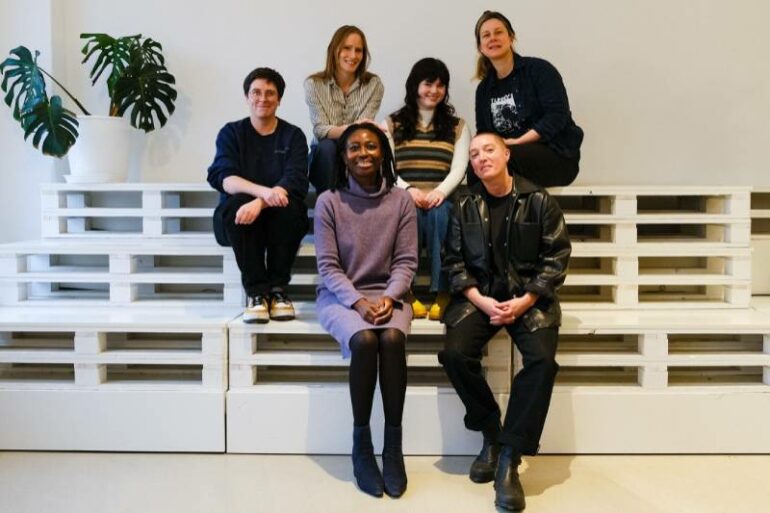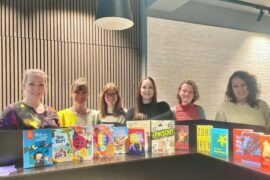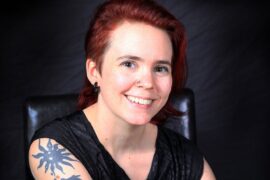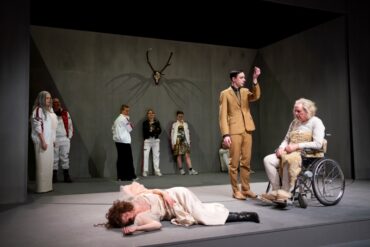From the 14th to the 16th of November, the British Council invites literature enthusiasts, students, and academics to Berlin for the 38th Literature Seminar, offering an opportunity to delve into the works of some of today’s young British writers. Featured authors Camilla Grudova, Sarah Bernstein, K Patrick, Eliza Clark, and Eley Williams bring their stories to life through captivating readings, providing insight into their creative processes and themes. The participants are not only able to hear readings from the authors’ books but also learn about their creative processes, influences, and the stories behind their writing. This interaction with the writers themselves becomes one of the most enriching aspects of the event, offering a deeper understanding of their unique voices and the works they bring to life.
By Anna Savchuk and Sofia Peslis
Picture: Alina Cherubin
The seminar starts with a reading by Helen Oyeyemi from her novel Parasol Against the Axe, followed by a discussion led by Granta editor Thomas Meaney. Oyeyemi, chair of the 38th British Council Seminar, is a British novelist and short story writer and was a judge for Granta’s Best of Young British Novelists 2023. The story showcases Oyeyemi’s imaginative, multifaceted writing style, blending magical realism, fairy tale logic, and literary complexity. During the discussion, Oyeyemi shares her love for Prague, describing it as a place of happiness and peace. Her book explores interwoven stories, reflecting the intricate connections of city life and its diverse inhabitants. Oyeyemi’s writing is smooth and comforting, filled with curiosity and energy that immerses readers in imaginative yet relatable worlds. She emphasizes her focus on language, rhythm, and flow rather than plot, saying, »I don’t care about plots. I just open the book and look at a few sentences to decide if I want to read it«.
Painting the Grotesque
The Friday readings begin with Camilla Grudova, whose work bridges the unsettling and the artistic. Reading from her recent book The Coiled Serpent, an almost discomforting collection of stories, Grudova introduces the audience to her specific creative approach. »My work is a bit gross and dark, but I am really not like that as a person«, she jokes, drawing laughter with her dry humor. She shares her history with the grotesque, revealing that her art history background informs her writing. Her stories are to her like paintings in the reader’s mind, she says. Therefore, vivid, descriptive language is more important to her than dialogue.
Grudova expresses a strong preference for short stories, claiming, »Every writer is either drawn to one or the other. You can’t put a short story into a novel or the other way around«. Her literary influences include 20th-century women’s writings, Soviet authors, and particularly T. S. Eliot, whom she describes as her »imaginary friend« and a guide to crafting her own short stories. Chaired by Oyeyemi, the session feels natural and conversational, with Grudova responding openly to audience questions about her inspirations and experiences. Her honesty and wit make for an engaging start of the day, leaving the audience motivated and profoundly moved by her surreal, boundary-pushing narratives.
Between Sound and Silence
Sarah Bernstein takes the stage next, reading from her haunting novel Study for Obedience. Chaired by Jewish-Canadian playwright and author Jonathan Garfinkel, the session takes on a decidedly thoughtful tone. The story’s unnamed narrator, tasked with caring for her brother in a remote northern town, faces bizarre and catastrophic events. From a sow crushing her piglets to cattle madness, the narrative explores themes of blame, agency, and cultural identity. Bernstein humorously assures the audience that the brother in her book is not her own, adding that while the character’s relationship with him is rather strange, it’s purely a reflection of the story’s dynamics – not her family life. The audience laughs at this playful disclaimer.
Though Bernstein shares that the book’s atmospheric setting and surreal events draw heavily from her own history and her time living in the countryside, she emphasizes the universality of its themes. Reflecting on her Jewish roots, she notes how remembrance can sometimes feel retraumatizing for victims. She observes that in the current context Jewish narratives are often used to frame conflicts like the Gaza war – a direction she consciously avoids. Guided by Garfinkel, the session finds a thoughtful match in his understanding of Jewish identity and cultural reflection.
Writing, for Bernstein, is an intuitive process, beginning with sounds and the voice in her head. This approach fills her work with a deeply personal resonance. Ending the session with a touch of humor, she apologizes for the serious tone, lightening the mood after the earlier, more comedic reading and leaving the audience feeling both moved and connected.
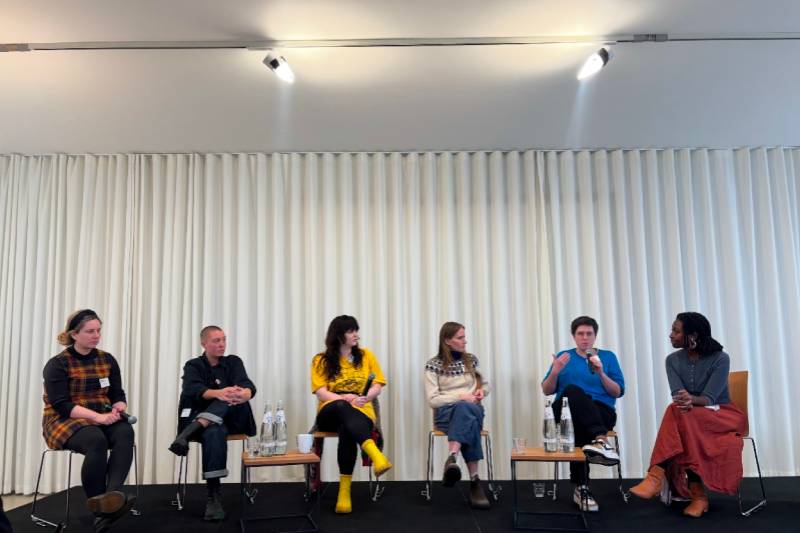
Picture: Sofia Peslis and Anna Savchuk
Digesting the Details
After the panel discussion called Microscope, comedy writer Eliza Clark reads from her short story collection She’s Always Hungry and then participates in a Q&A session chaired again by Oyeyemi. Clark blends vivid descriptions with gripping, clever plots: »I am the most plotty among today’s seminar writers«, she remarks, highlighting her distinctive approach.
She’s Always Hungry was written during the pandemic, which inspired stories like The Shadow Over Little Chitaly, styled as a restaurant review webpage. Clark draws her ideas from social media comments and online discussions, which may have something to do with her variety of genres, from science fiction (Hollow Bones) to dystopian tales (She’s Always Hungry). A meticulous writer, Clark revisits older, unpublished works, refining them as an »aggressive editor« before she submits them to her publishers. Her talent for creating lively, relatable characters shines in stories addressing societal issues, such as Build a Body Like Mine on eating disorders and The Problem Solver on victim blaming. Her work combines sharp entertainment with deep reflections on modern life, offering a variety of perspectives that cater to different interests and ensuring readers can connect with stories that speak to their own experiences. All in all, Clark shows her humorous and open personality through this reading, engaging the audience through an entertaining discussion and relatable stories.
Unspoken Heat
K Patrick’s reading offers a strikingly different approach, with their debut novel Mrs S exploring the forbidden love between a young Australian woman and the headmaster’s wife in an elite English boarding school during a sweltering heatwave. The novel focuses on the sensuality of their illicit affair, where the unspoken desire intensifies over time. Describing their writing process with dry humor, Patrick says, »It’s fine – it’s annoying«. This captures the grounded, no-frills approach they bring to their work. Patrick emphasizes the blurring of boundaries in their writing between what is said and what is thought: a technique made apparent by the absence of quotation marks in dialogue. Patrick’s focus on the physicality and emotional depth of their characters allows readers to feel the weight of their desires and choices, making the connection between the protagonists almost palpable. The raw, unfiltered emotions that emerge through their writing challenge readers to reflect on their own experiences of longing, boundaries, and the consequences of unspoken relations. Patrick also highlights the value of collaboration in the writing process, acknowledging the importance of how others resonate with a text: »You learn so much about writing from other people who read it«. The relaxed vibe of the session invites the audience to connect more deeply with Patrick’s work, creating an atmosphere where the focus is just as much on the readers’ reactions as it is on the text itself.
The Art of Natural Humor
Eley Williams closes the second day of the seminar with readings from her collection Moderate to Poor, Occasionally Good, being chaired again by Garfinkel. Williams masterfully combines humor and wit to turn everyday moments into calming, fairytale-like stories that help readers unwind. She admits reading her work is more enjoyable than writing it, as her ideas often outpace the process of bringing them to life. Her humor »emerges within a draft«, which makes her jokes natural and unassertive and ensures her stories evoke positive reactions. For this particular reason, Williams’ writing is a performance, as she admits, that comes out as a response to her curiosity.
In one reading from Moderate to Poor, Occasionally Good, Wiliams playfully explores the contagiousness of yawning as an evolutionary response to low oxygen, stating that if one needs to yawn: »Now is the time!«. Despite the complexity of the concept, she keeps the story engaging and entertaining. She views literature as a timeless medium: »To live is to have an in-built obsolescence, but storytelling will never get outdated«. Williams finishes the session with a striking idea that while human existence is inherently temporary, the stories we tell through literature transcend this limitation.
You can find the first part of the conference report here.


